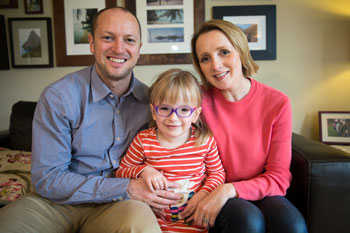 The first children to receive a genetic diagnosis through the 100,000 Genomes Project have been given their results at Great Ormond Street Hospital (GOSH) in London.
The first children to receive a genetic diagnosis through the 100,000 Genomes Project have been given their results at Great Ormond Street Hospital (GOSH) in London.
The results, which pinpoint changes in different single genes as the cause of two previously undiagnosed conditions, come from the first wave of families recruited as part of the pilot phase of the project.
As well as removing a large amount of uncertainty for the families, the results stand to have a major impact on many areas of their lives including future treatment options, social support and family planning. They also have the potential to help many more children with undiagnosed conditions who may be tested for these genetic mutations early on and be offered a diagnosis to help manage their condition most effectively.
The main 100,000 Genomes Project, launched in December 2014, set out to sequence 100,000 whole human genomes to help researchers and clinicians better understand, and ultimately treat, rare and inherited diseases and common cancers.
Professor Lyn Chitty, a clinician at GOSH and clinical lead for the NTGMC, says: “It’s really exciting to see the results coming through and the difference this can make for families. It increases confidence in the project and shows that the application of genomics can live up to the promise of changing the way we diagnose and treat patients in the future.”
Researchers also hope that the positive results will help to encourage more clinicians to refer patients to the project so that a greater number of families can be tested and helped.
GOSH Consultant in Clinical Genetics, Professor Maria Bitner-Glindzicz says: “With undiagnosed genetic conditions it really is a case of the more families we test, the more we can diagnose. In order to confidently say that a particular gene is likely to be the cause of a condition and not just natural variation that we see in everyone’s genes, we have to match up gene mutations and symptoms across several children to find common features. The more children we therefore have to cross check against, the more likely it is that we can find these common features and give a diagnosis.”
Georgia’s story
Four-year-old Georgia Walburn-Green from the UK is one of the first children to have her precise genetic abnormality identified through the 100,000 Genomes Project.
Georgia’s mum Amanda describes the day she was born “When Georgia was born we had 20 blissful, worry-free minutes and then our world was shattered, “The curtains were drawn round my bed and we were told that there may be a problem. A number of tests were carried out but all came back clear so we were discharged feeling apprehensive.”
Amanda said “Between ages of one and two, we discovered all the problems Georgia had one by one. As well as both physical and mental developmental delay, we found that she has a rare eye condition that affects her sight; her kidneys don’t function properly and she has verbal dyspraxia, meaning we don’t know if she will ever talk.”
Amanda describes finding out about the 100,000 Genomes Project “As soon as I heard about the project, I wanted to get on it.”
“It was almost exactly a year until we received a phone call from Maria. When she said that they’d found something it was one of the biggest days of my life. She explained that they had found a mutation in one half of a single gene in Georgia, which was likely to be the cause of her problems.
“They will probably find many more children with the same condition now as when they see a child with a neurological condition, they can check for this gene to start with.
Amanda explains how the diagnosis will change her family’s life “The diagnosis is going to change quite a few things for us. We always thought we’d have another child but because it was unknown if this was an inherited condition we were told that the chances of reoccurrence could be as high as 1 in 4. We held off expanding our family because of this but have now been told that we only have a 1 per cent chance of this happening again.
As for Georgia, we are hoping that over time we will find out more about her condition and her prognosis. We also hope to connect with the other families that have children with the same gene change.”
Find GOSH at Arab Health
GOSH will be exhibiting at Arab Health in the Dubai International Convention & Exhibition Centre on the 25th – 28th January 2016. Find them at stand Z1C14 in the UK Pavillion where you can chat with GOSH staff about the range of clincial services they offer.
About GOSH
GOSH is a world-class centre of excellence with over 50 different paediatric specialities under one roof. Through pioneering translational research, GOSH provides cutting-edge treatment for the rarest and most complex paediatric conditions.
External endorsements:
- The Children’s Hospitals International Executive Forum (CHIEF) rate GOSH as one of the four leading paediatric research hospitals in the world
- For the last three years, GOSH together with the Institute of Child Health, has been in the top five centres in the world for research published
- Between 2010-2014, GOSH/ICH research papers had the highest citation impact of any children’s hospital in the world, as reported by Thomson Reuters

